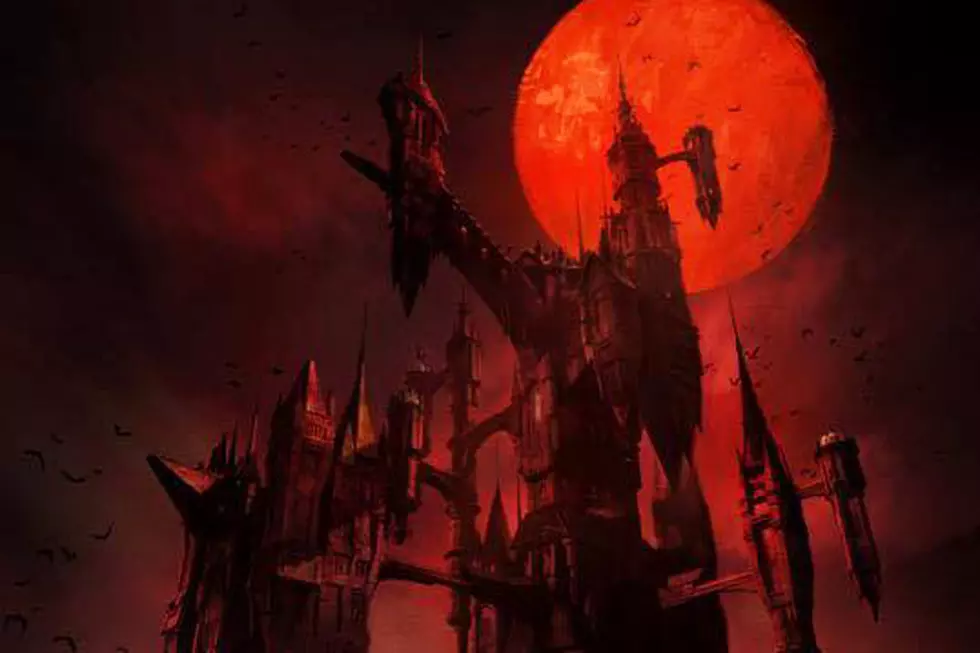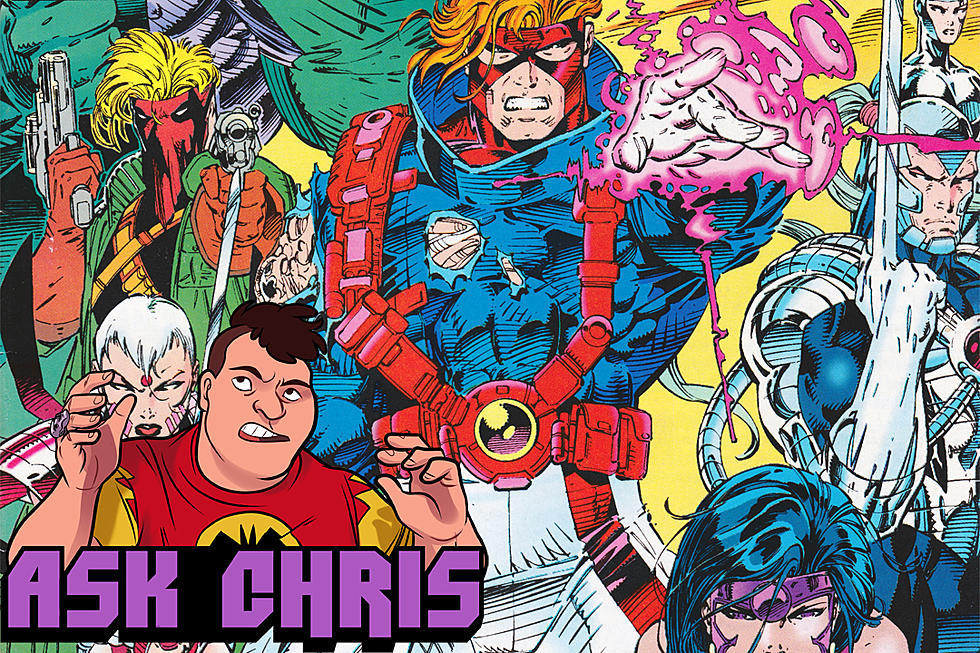
Filthy Assistance: Revisiting ‘Transmetropolitan: Lonely City’
In the 1990s, Warren Ellis and Darick Robertson foresaw a future of twisted behavior, renegade politics, and uncontrollable technology in Transmetropolitan. We’re revisiting the series book by book, because in a time of unrest and uncertainty we could all use some Filthy Assistance.
Lonely City shows the City finding its way into the spring, enduring as best as it can while Spider and his gang take stock and try to get back to work. Then the bottom drops out of the world as they catch a glimpse of just how bad the incoming President is going to be, while bodies start to pile up and the truth gets cut off at the knees…
The first thing that hits you when opening up Lonely City, apart from the rubric crediting Rodney Ramos with inks, Nathan Eyring with colors, and Clem Robins with lettering, is the introduction from Patrick Stewart. Stewart wanted (and may still want) to play Spider Jerusalem in an adaptation of Transmetropolitan. The intro cites his most iconic role as Jean-Luc Picard (1987-2002) but in today’s “you’re old” moment, Professor X may actually be his more iconic role by now, and it is actually the one he played for longer (2000-2017; seventeen years to fifteen).
Comics characters never age, and maybe they fool us into thinking we never will either.
The first story in Lonely City has Spider Jerusalem in a contemplative mood, weighing how far humanity has come --- living in an era where rain is welcomed as cleansing. instead of feared for its acidity, living longer than any human in history --- and how, despite it all, humanity still seems so venal and cruel and foolish and doomed.
“How could people do this” is both the most 2017 question, and the most relevant question in all of history. If “why do we suffer” is the hole in religious theory, then “why do we make people suffer” is the hole in the theory of human progress, the question that hangs over Transmetropolitan. Is the technology to replicate anything with a machine in your basement really a step forward if there are still people so poor that they can’t eat? Does technological progress really count as progress if political systems and humanity’s flaws mean that the power to wield it keeps winding up in the hands of authoritarians with a mile of grudges behind them?
Spider’s writing has always been about poking his head through this hole in the theory of human progress and seeing what’s on the other side, and the next story is “21 Days in the City,” a break with traditional storytelling; 21 full-page or two-page shots, with a text piece by Spider anchoring each one. It’s some of the best writing in the series, so well done that an entire one-shot was dedicated to this same style of work, and even though little of it ties directly into the plot, it’s illuminating nonetheless.
After his defeat, the Beast disappears. Fred Christ comes back, minor characters return to the narrative, but for one of Spider’s greatest nemeses, that’s all she wrote. It’s still a daring move, all these years later, from a fictional perspective --- setting up one villain and then supplanting him with the less obvious, more dangerous up-and-comer. It’s completely true to life, also, because that’s politics for you; second place in a first-past-the-post system just means you’re the first loser, broken by the system that made you. Longmarch, held up in anecdotes as the previous opponent to the Beast, appears only as a CGI cartoon. Life goes on. The system endures.
Spider, Yelena, and Channon take on that system in “Monstering,” which takes the notion of a docile, only-ask-acceptable-questions press corps and lobs a grenade into it, communicating Spider’s entire philosophy of journalist by putting it up against its opposite; a press corps so afraid to let a single accusation of “bias” stick to them that they’ll meekly roll over for a politician that knows how to play them, and equate the mundane with the profane, questing for a truth somewhere in the middle.
The trio renders all this absurd, and gets the media to go along with them, by merely shouting that the Emperor is wearing not a stitch. Sometimes that’s all it takes.
Introduced in “Monstering” is a device called a g-reader, which plays heavily into the main storyline of Lonely City, as a hate crime is perpetrated on someone with a recessive third-generation genetic trait --- again, that hole in human progress coming around again. We’re introduced to the infrequent yet important minor character of Detective Newton…
... continuing the theme of “women are more willing to call Spider out on his crap” that the series has kept thus far. (He complains constantly about not being able to get a date, yet he never asks why...)
The trait involves possessing multiple genitalia, and the resultant hate crime hews uncomfortably close to hate crimes against trans, nonbinary and intersex people, which is one of the many types of hate crime --- along with Islamaphobic and anti-Semitic hate crimes --- that have seen an uptick this year. The perpetrators get let out on bail, which plays out exactly as well to a street full of protestors as you’d think.
The riot, and its aftermath, is where the quietude and skill of Transmetropolitan’s storytelling truly shines. The police open fire and the riot is over in seconds, because it turns out you can kill a lot of people very quickly with an automatic weapon. The quiet afterwards is chilling, communicated in posture and facial expressions, as the group lives with a silence that means there’s no one left to make noise.
Spider and the gang have a confrontation with Detective Newton that is elegant in how the story is told, with Newton turning her head --- and the badge tattooed on her face --- away from Spider, and keeping it hidden from his view for the rest of the page. Literally turning the other cheek, and ensuring that the eye of the law looks the other way, all conveyed with dialogue where she’s ensuring, without ever saying it outright, that Spider has vital information he needs to continue his investigation.
Spider and crew stagger home, Spider writes his column, and then the real kicker comes in; the new President has wasted no time making his presence felt, and has brought in something called a d-notice that literally restricts the Word from publishing Spider’s column. It’s described as a new invention, but it’s actually a real thing --- an import from the UK that Ellis brings into Transmetropolitan’s future, sending a shockwave through the book.
Spider may not like his audience, and he may not have faith that he can get through to his audience, but he at least rested on the certainty that he could reach them, that this simple principle of journalism could be counted on. But now the foundation’s given way, and the world is about to become a very scary place to be a journalist.
We’ll see how scary in two weeks’ time, as Spider’s relationship with the Word and with his own celebrity all comes to a head in Gouge Away.
And now, your Moment of Royce:
If you would like to support good journalism — which never stops being necessary in any era — these organizations can always use your help:
More From ComicsAlliance

![Jenny Sparks Enters The Scene In Ellis And Davis Hunt’s ‘The Wild Storm’ #3 [Preview]](http://townsquare.media/site/622/files/2017/03/TWS_Cv3_000.png?w=980&q=75)







